You Betta Werk!: Professors Talk Style Politics
By Tanisha C. Ford
In recent years, appropriate attire for professors has been a hotly debated topic. Scholars from various disciplines have offered instruction, fashion tips and personal narratives about the importance of dress. In response to my article, Haute Couture In The Ivory Tower, professors of color posted on my Facebook and twitter pages, recounting their own fun and sometimes troubling stories related to dress in the academy.
The lively conversations in the social mediasphere motivated me to put on my “Oprah” hat (a stylish Chanel one of course!). I interviewed several female and male hip hop generation professors who make it werk (Tim Gunn voice) everyday on campuses across the country. Yet, their stylish choices and intellectual talents do not immunize them from scrutiny and questions. In fact, my interviews reveal a heightened level of criticism, shock, and awe particularly directed at women of color faculty.
Below are excerpts from some of the interviews I conducted with women professors of color. Together, these interviews illustrate that studies on fashion and adornment politics offer a powerful lens through which we can explore other important issues such as women’s rights, motherhood and relationship status, pleasure and sexuality, and the politics of “respectability.”
I asked them the following questions:
- How do you incorporate your personal fashion sense into your professional attire?
- Do you think women and/or men of color in the academy face unique challenges that are (directly or indirectly) linked to a politics of dress and adornment?
Dr. Siobhan Carter-David is an Assistant Professor of History at Southern Connecticut State University and the curator of “Strong Shoulder: Revisiting the Women’s Power Suit.”
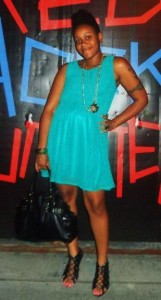 I incorporate my personal style into my professional attire by mixing the moderate (sometimes, even conservative) with the extreme. Exposed tattoos are coupled with silk dresses, ornate vintage belts and handbags, and “serious” statement jewelry. I do have to make some small changes to accommodate my pregnancy. I choose shift dresses, pretty tunics with tights, and cute fitting blazers (left open) to go along with my pregnant look. I do think that women and men of color face unique challenges that are linked to our politics of adornment. Being an expectant mom does add another dimension to these politics. While I am not socially conservative, I must admit that I find comfort and security in prominently displaying my wedding ring(s) while pregnant. It is a defense mechanism against the prejudices of students, faculty and staff on campus. I was prejudged during my first pregnancy five years ago. I am African American, appear several years younger than my actual age (so I’ve been told), with a style aesthetic that I refuse to give up. In my students’ eyes, I looked like a “ghetto teenager” since I don’t wear pumps and pearls. Despite my accomplishments and credentials, I am still proud to be that girl from the Bronx. But my students’ could not imagine me as also being a wife, mother, and intellectual. That girl, they imagine, doesn’t know shit about the social and cultural implications of [U.S.] Reconstruction.
I incorporate my personal style into my professional attire by mixing the moderate (sometimes, even conservative) with the extreme. Exposed tattoos are coupled with silk dresses, ornate vintage belts and handbags, and “serious” statement jewelry. I do have to make some small changes to accommodate my pregnancy. I choose shift dresses, pretty tunics with tights, and cute fitting blazers (left open) to go along with my pregnant look. I do think that women and men of color face unique challenges that are linked to our politics of adornment. Being an expectant mom does add another dimension to these politics. While I am not socially conservative, I must admit that I find comfort and security in prominently displaying my wedding ring(s) while pregnant. It is a defense mechanism against the prejudices of students, faculty and staff on campus. I was prejudged during my first pregnancy five years ago. I am African American, appear several years younger than my actual age (so I’ve been told), with a style aesthetic that I refuse to give up. In my students’ eyes, I looked like a “ghetto teenager” since I don’t wear pumps and pearls. Despite my accomplishments and credentials, I am still proud to be that girl from the Bronx. But my students’ could not imagine me as also being a wife, mother, and intellectual. That girl, they imagine, doesn’t know shit about the social and cultural implications of [U.S.] Reconstruction.
Dr. Tiffany Gill is an Associate Professor of History and African and African Diaspora Studies at the University of Texas at Austin and the author of the award-winning book Beauty Shop Politics: African American Women’s Activism in the Beauty Industry.
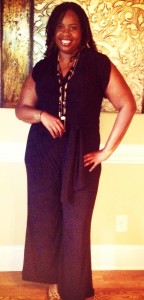 I focus on wearing pieces that make me feel confident, feminine and powerful. I focus on bold colors and prints, trendy accessories, classic staple pieces, and my signature face: dramatic eye makeup and sparkly lip gloss. When I stand in front of a lecture hall full of sleepy undergraduates, sit around a conference table during a long faculty meeting, or give a public lecture on my research, my style allows me to bring the various aspects of my life together in a way that is unapologetically me. While I’ve always been confident in my personal style as a professor, even as it departs heavily from that of most of my white colleagues, I have never underestimated the peculiar challenges I have as a young (I got my first tenure track job at 29) black woman in the academy. I’ve had many instances, especially early in my career, when students have entered my classroom looking for the professor and were astonished when they realized that it was me…As such, I have always known that I have had to fight to earn the respect that some of my colleagues automatically receive by virtue of embodying what a “real’ professor looks like…Today I see scholars of color in my generation flexing our intellectual as well as aesthetic prowess in unprecedented ways. We have reclaimed the pleasure of style and have merged it with the rigors of intellectual pursuit. The academy must be willing to embrace a multiplicity of style choices as well as intellectual perspectives.
I focus on wearing pieces that make me feel confident, feminine and powerful. I focus on bold colors and prints, trendy accessories, classic staple pieces, and my signature face: dramatic eye makeup and sparkly lip gloss. When I stand in front of a lecture hall full of sleepy undergraduates, sit around a conference table during a long faculty meeting, or give a public lecture on my research, my style allows me to bring the various aspects of my life together in a way that is unapologetically me. While I’ve always been confident in my personal style as a professor, even as it departs heavily from that of most of my white colleagues, I have never underestimated the peculiar challenges I have as a young (I got my first tenure track job at 29) black woman in the academy. I’ve had many instances, especially early in my career, when students have entered my classroom looking for the professor and were astonished when they realized that it was me…As such, I have always known that I have had to fight to earn the respect that some of my colleagues automatically receive by virtue of embodying what a “real’ professor looks like…Today I see scholars of color in my generation flexing our intellectual as well as aesthetic prowess in unprecedented ways. We have reclaimed the pleasure of style and have merged it with the rigors of intellectual pursuit. The academy must be willing to embrace a multiplicity of style choices as well as intellectual perspectives.
Dr. Asia Leeds is an Assistant Professor of African Diaspora & World Studies at Spelman College.
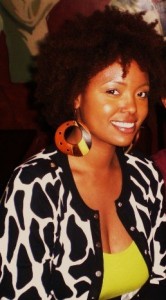 One of my friends describes my style as “urban-earthy.” I’ll mix an African print dress with a black blazer, for example. On days that I wear a more understated or monochromatic outfit, I’ll incorporate a pop of color with shoes. Fun, colorful belts are also a way that I bring a plain black or navy blue dress to life. Needless to say, I need color in my life! It gives me energy. I don’t like to look like everyone else; my personal style is an important extension and reflection of my identity. I am young, a global citizen, and “Afropolitan,” if you will. During one postdoctoral experience, however, I wore a head wrap to campus and had a meeting with colleagues that day. I wasn’t trying to make a statement, but inevitably I did. My colleagues (none were black) were so intrigued–a little too intrigued for my taste–and I felt like they were exoticizing me, as I felt they had with my previous hairstyle and jewelry choices. They always reacted in seemingly positive and excited (and anthropological!) ways, but I don’t feel comfortable having SO MUCH attention on what I am wearing, especially when we should be discussing research and ideas! The best thing about academia is that you can define “professional” for yourself. Now that I’m teaching at an HBCU and a women’s college, I do feel like I have to present myself as a role model, in terms of fashion, feminism, and as a ‘natural hair ambassador.’ I want students to take note of how Afros, African prints, etc. can look professional.
One of my friends describes my style as “urban-earthy.” I’ll mix an African print dress with a black blazer, for example. On days that I wear a more understated or monochromatic outfit, I’ll incorporate a pop of color with shoes. Fun, colorful belts are also a way that I bring a plain black or navy blue dress to life. Needless to say, I need color in my life! It gives me energy. I don’t like to look like everyone else; my personal style is an important extension and reflection of my identity. I am young, a global citizen, and “Afropolitan,” if you will. During one postdoctoral experience, however, I wore a head wrap to campus and had a meeting with colleagues that day. I wasn’t trying to make a statement, but inevitably I did. My colleagues (none were black) were so intrigued–a little too intrigued for my taste–and I felt like they were exoticizing me, as I felt they had with my previous hairstyle and jewelry choices. They always reacted in seemingly positive and excited (and anthropological!) ways, but I don’t feel comfortable having SO MUCH attention on what I am wearing, especially when we should be discussing research and ideas! The best thing about academia is that you can define “professional” for yourself. Now that I’m teaching at an HBCU and a women’s college, I do feel like I have to present myself as a role model, in terms of fashion, feminism, and as a ‘natural hair ambassador.’ I want students to take note of how Afros, African prints, etc. can look professional.
Dr. Treva Lindsey is an Assistant Professor of Women’s and Gender Studies at the University of Missouri who lectures on hip hop soul and black women’s sexual politics.
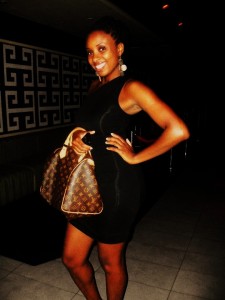 I proudly identify as a “single black female addicted to retail!” (Thanks Ye!)…One of my many nicknames, Dr. Diva, conveys a sense of the connection I make between my personal fashion sense and my professional attire. As a self-proclaimed diva, I embrace audacity, timelessness, sultriness, and an unwavering commitment to feminine artifice…I strive to feel fully present in my professional attire. More likely than not, I will have on some fly heels or boots and a perfectly tailored pair of slacks or a form-fitting knee length dress…On that rare occasion, when I question if a dress or skirt is appropriate, I tend to go for it. I write about African American women defying conventions and rejecting politics of respectability—so why not explore the terrain of defiance and boldness in my personal-professional style? In addition to the many challenges people of color in the academy face, we must combat particular challenges regarding attire and adornment that often inscribe our experiences. From politics of respectability to controlling images such as the Jezebel, professors of color navigate a volatile terrain of self-presentation. Many of the issues we combat entail multiple fronts. I feel pressure to “dress” professionally, while many of my white male counterparts do not feel a similar pressure. BUT, if I look “too fashionable,” questions arise about my commitment to being a scholar…Ultimately, I know it matters “what we wear,” and yet, the complexity of politics surrounding how we adorn ourselves continues to perplex me.
I proudly identify as a “single black female addicted to retail!” (Thanks Ye!)…One of my many nicknames, Dr. Diva, conveys a sense of the connection I make between my personal fashion sense and my professional attire. As a self-proclaimed diva, I embrace audacity, timelessness, sultriness, and an unwavering commitment to feminine artifice…I strive to feel fully present in my professional attire. More likely than not, I will have on some fly heels or boots and a perfectly tailored pair of slacks or a form-fitting knee length dress…On that rare occasion, when I question if a dress or skirt is appropriate, I tend to go for it. I write about African American women defying conventions and rejecting politics of respectability—so why not explore the terrain of defiance and boldness in my personal-professional style? In addition to the many challenges people of color in the academy face, we must combat particular challenges regarding attire and adornment that often inscribe our experiences. From politics of respectability to controlling images such as the Jezebel, professors of color navigate a volatile terrain of self-presentation. Many of the issues we combat entail multiple fronts. I feel pressure to “dress” professionally, while many of my white male counterparts do not feel a similar pressure. BUT, if I look “too fashionable,” questions arise about my commitment to being a scholar…Ultimately, I know it matters “what we wear,” and yet, the complexity of politics surrounding how we adorn ourselves continues to perplex me.
Dr. Amrita Chakrabarti Myers is an Associate Professor of History at Indiana University-Bloomington and the author of the award-winning book Forging Freedom: Black Women and the Pursuit of Liberty in Antebellum Charleston.
 My favorite color is red (it’s my “power color”) so I try to incorporate it (and other, bold hues) into my professional attire in order to give my teaching outfits a little “pop.” …Many of my outfits are actually very low-key. I veer toward the classic over the trendy any day, likely a holdover from my days in investment banking. But, [my outfits] appear “pulled together” or punched up because I’ve paired a basic skirt or classic dress with a great pair of patchwork suede boots, for example. I’ve noticed that many of my older, white colleagues (male and female) have a somewhat peculiar reaction to my attire, and to the attire of women of color in general. Their comments have often implied that those who “look good” must not be terribly bright, or that they are maybe not as serious about history, or not as intellectual as they are, because they are too focused on clothing and other “frivolous” matters… On the flip side, however, if I showed up in the classroom dressed the way many of my older white colleagues do (particularly the male ones) I would have an impossible time being treated with respect by my students. Many of them are already inclined to be disrespectful towards me because I look young, am female, short in stature, and a person of color. How I dress thus does matter, and there is clearly a politics of dress. At the end of the day, I dress for myself, but I am always cognizant that others are watching.
My favorite color is red (it’s my “power color”) so I try to incorporate it (and other, bold hues) into my professional attire in order to give my teaching outfits a little “pop.” …Many of my outfits are actually very low-key. I veer toward the classic over the trendy any day, likely a holdover from my days in investment banking. But, [my outfits] appear “pulled together” or punched up because I’ve paired a basic skirt or classic dress with a great pair of patchwork suede boots, for example. I’ve noticed that many of my older, white colleagues (male and female) have a somewhat peculiar reaction to my attire, and to the attire of women of color in general. Their comments have often implied that those who “look good” must not be terribly bright, or that they are maybe not as serious about history, or not as intellectual as they are, because they are too focused on clothing and other “frivolous” matters… On the flip side, however, if I showed up in the classroom dressed the way many of my older white colleagues do (particularly the male ones) I would have an impossible time being treated with respect by my students. Many of them are already inclined to be disrespectful towards me because I look young, am female, short in stature, and a person of color. How I dress thus does matter, and there is clearly a politics of dress. At the end of the day, I dress for myself, but I am always cognizant that others are watching.
Dr. Ebony Utley is an Associate Professor of Communication Studies at California State University Long Beach and the author of the critically acclaimed Rap and Religion: Understanding the Gangsta’s God.
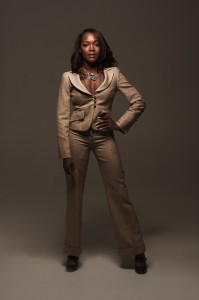 My personal style manifests in my professional attire via period dresses and heels. Every day of lecture throughout the semester I wear a different dress so students are shocked when I show up to the final in jeans. Because students dress increasingly casually, I don’t feel pressure to suit it up. That would create too much of a division between me and them. Also, because I teach popular culture classes or courses with huge popular culture components, I need to look like I know what’s trendy or I lose my credibility. I often “shop my students.” By that I mean, take stock in what’s trendy for them and try to incorporate some of the accessories or styles into my own look so that I can continue to connect with a younger and younger crowd. I’ve never seen my wardrobe as a justification for who I am or a justification for my presence in a certain space. My sartorial choices have always been reflective of my personal style not others’ expectations of me. And truthfully, those expectations have always been relatively low—because I look younger than my age (which is younger than most), and because of my race and gender. No one expects me to open my mouth and sound smart. I use that to my advantage, especially when surrounded by strangers… If anything, I think there are more young professors who aren’t afraid to [express their personal style] because the penalty for surviving this academic game and losing yourself is just too high.
My personal style manifests in my professional attire via period dresses and heels. Every day of lecture throughout the semester I wear a different dress so students are shocked when I show up to the final in jeans. Because students dress increasingly casually, I don’t feel pressure to suit it up. That would create too much of a division between me and them. Also, because I teach popular culture classes or courses with huge popular culture components, I need to look like I know what’s trendy or I lose my credibility. I often “shop my students.” By that I mean, take stock in what’s trendy for them and try to incorporate some of the accessories or styles into my own look so that I can continue to connect with a younger and younger crowd. I’ve never seen my wardrobe as a justification for who I am or a justification for my presence in a certain space. My sartorial choices have always been reflective of my personal style not others’ expectations of me. And truthfully, those expectations have always been relatively low—because I look younger than my age (which is younger than most), and because of my race and gender. No one expects me to open my mouth and sound smart. I use that to my advantage, especially when surrounded by strangers… If anything, I think there are more young professors who aren’t afraid to [express their personal style] because the penalty for surviving this academic game and losing yourself is just too high.
These interviews elucidated the reality that women of color in particular face complex adornment politics. A Chronicle of Higher Education article, Professors: Hot At Their Own Risk, demonstrates the challenges of being an attractive and stylish black, female academic. Commenters—self-identified as professors—targeted Professor Ebony Utley who unapologetically stated that she cares about her appearance and strives to looks nice. They posted insensitive remarks such as, “If this is what she wears when she lectures then I’m not surprised she is approached by students,” when responding to Utley’s story about a student who told her she could “make more money as a high class hooker.” Another scolded, “We’re not there to be ‘hot.’ We’re there to teach.” Utley and other women of color aren’t hearing any of this. Instead, they are continuing to use their personal style to define “appropriate” and “professional” on their own terms.
______________________________________________
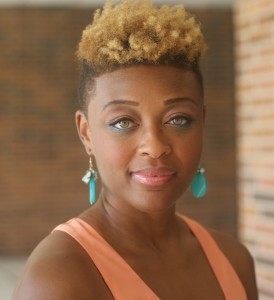 Tanisha C. Ford, Ph.D., is an award-winning writer, intellectual, and activist designing her own brand of “Haute Couture Intellectualism.” She is currently writing a book, Liberated Threads: Black Women and the Politics of Adornment. She is an Assistant Professor of Women, Gender, Sexuality Studies at the University of Massachusetts-Amherst. Follow her on Twitter @SoulistaPhd.
Tanisha C. Ford, Ph.D., is an award-winning writer, intellectual, and activist designing her own brand of “Haute Couture Intellectualism.” She is currently writing a book, Liberated Threads: Black Women and the Politics of Adornment. She is an Assistant Professor of Women, Gender, Sexuality Studies at the University of Massachusetts-Amherst. Follow her on Twitter @SoulistaPhd.




36 Comments